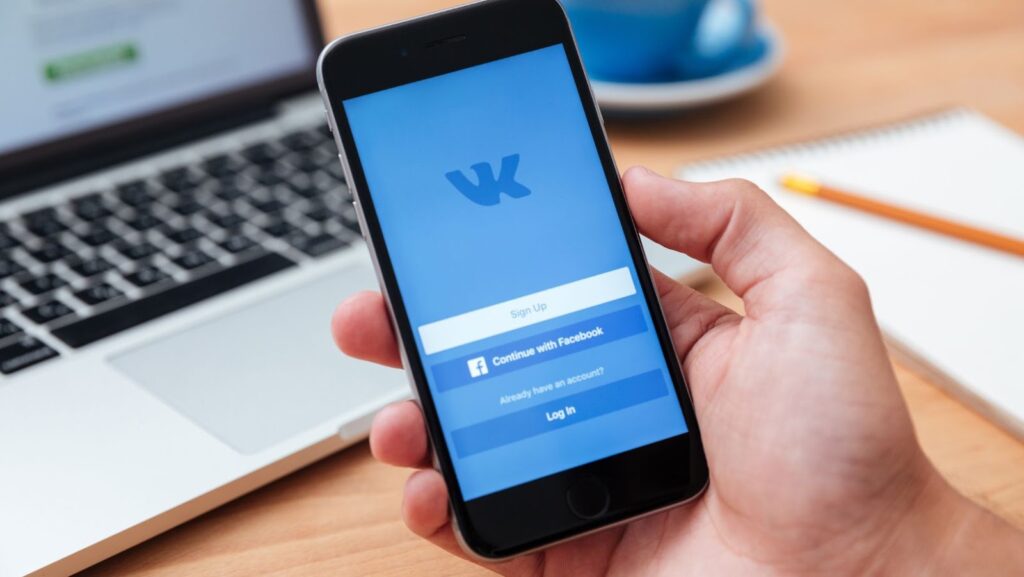
After months of government-imposed pressure, Apple finally caved and restored the popular Russian social network VKontakte to its App Store. However, while the restrictions on Russia’s largest social media platform may have been lifted for now, it remains to be seen how long before Apple and VKontakte have yet another falling out.
The Background of VKontakte
VKontakte (VK) is a Russian-based social networking service launched in 2006. By 2013, VKontakte had become the world’s biggest social networking service with over 250 million individuals, surpassing Facebook in Russia and other CIS countries. The site allows users to get in touch with buddies and remain upgraded on information and occasions via accounts, messages, and teams. VKontakte or VK has encountered numerous political problems over the years. However, in 2017, after Roskomnadzor (Russia’s federal censorship authority) put pressure on Apple to limit the website including its online store by changing access rights in its App Store, Apple restored VK and other Roskomnadzor-restricted websites at the request of the Russian government.
From 2014 to 2019, VK was also popularly referred to as ‘The Rusky Facebook’ as it retained a strong user base among nuclear scientists from Russia’s closed nuclear cities due to its comparatively more lenient privacy and data sharing laws than Facebook. This popularity also strengthened state monitoring and control of content published on VK accounting for hundreds of regional bans during this period.
Today, VK remains one of the most popular social networks outside North America — rivaling Twitter for usage among teenagers — particularly due to its focus on multimedia features such as music streaming, video sharing, local groups, document sharing etc which are absent from other popular networks like LinkedIn or Instagram.

Apple Restored Russian Social Network VKontakte
Following pressure from the Russian government, Apple Inc. has reinstated VKontakte, the Russian social network and messaging service, into the iOS App Store. The app had been removed in response to a copyright infringement complaint earlier this month. VKontakte is popular in Russia as it’s the country’s largest social networking platform with over 286 million monthly users. It is sometimes referred to as “Russia’s Facebook” due to its similar features such as messaging, friend lists, and posting updates.
Last week the Federal Agency for Supervision of Communications (Roskomnadzor) threatened to block the Apple App Store in Russia if VKontakte was not restored. The agency cited article 20 of its law which states that any website or application could be blocked if it does not comply with RuNet laws or contains banned content related to child pornography or illegal items Promotion of drugs and weapons.
In a statement from Apple Inc., they stated that they have looked into these concerns and have determined that part of what enabled VKontakte was a copyright issue for an engaged developer program and not an issue related to their new policy against controversial content violations outlined by Roskomnadzor. They further state that they will continue their partnership with Roskomnadzor to ensure compliance with their requirements while protecting user privacy rights under GDPR.
The Impact of the Restoration
The restoration of VKontakte on the Apple App Store has been met with a mixed reaction from users and governments worldwide. On the one hand, some people applaud Apple for doing what it believes is right for its users and restoring access to a popular social network in Russia. However, on the other hand, many governments and international human rights organizations have expressed concern that this decision could set a dangerous precedent of companies giving into government pressure and undermining international standards of freedom of expression.

This incident has sparked much debate about corporate responsibility in an increasingly globalized world. For example, it has raised questions about how companies should balance their legal obligations with their commitment to upholding fundamental freedom of expression rights. It has also highlighted the need for companies to adhere to certain ethical standards and uphold universal principles such as freedom of opinion, respect for diversity, tolerance, non-discrimination and equality when making decisions that impact their customers’ lives or international relations.
The Reactions of Users and Authorities
After VKontakte, Russia’s largest social media platform, was removed from Apple’s App Store late last year, the Russian government has been pressuring Apple for answers and its return. The resulting customer outcry has been swift, as many service users have voiced their displeasure at the ban. Authorities in Russia have also weighed in, with Communications Minister Nikolay Nikiforov saying that his ministry had “prepared appropriate measures in response” if the app did not return soon.
Given this mounting pressure and outcry from both users and authorities alike, Apple finally caved and restored VKontakte to its App Store earlier this month. Apple was hoping to avoid a showdown with Russian authorities over the decision by reverting their original policy of allowing VKontakte access to their app store.

The Future of VKontakte
The fate of VKontakte, the social network founded in Russia in 2006, has been in constant flux since then. The popular website has faced pressure from the Russian government for various reasons, including its refusal to comply with their requests to censor content. This resulted in Apple blocking access to VKontakte from their App Store for a short time. Despite this setback, the social network has persevered and was recently allowed back into the App Store after agreeing to certain terms demanded by the Russian government.
What will the future hold for VKontakte? Popular opinion is that it will continue to endure despite governmental pressure, provided it can make itself more attractive for users and reach out to new audiences looking for a social media experience outside of Facebook and Twitter. Its resilience thus far proves its potential—despite being blocked from the App Store more than once, it always finds its way back in—so there’s hope that VKontakte will stay around and remain a leader among social networks such as Instagram and Snapchat.
Conclusion: What Apple’s Move Means for Russia
Apple’s move to restore the social media app VKontakte to its App Store signals a key moment in Russia’s ongoing relationship with the tech giant. VKontakte, created by Russian entrepreneurs, boasts some 200 million monthly engaged users who will now have unrestricted access to Apple technology — a major win for the Russian government who has long sought control over the platform, both politically and financially.
The decision is equally beneficial for Apple, as restoring VKontakte’s place amongst its lineup of apps will not only help it reach users in Russia and boost its 2020 financial year income. After months of negotiation between Apple and Russia’s security team, the parties ultimately reached a mutually beneficial resolution. Ultimately, Apple’s concede to Russia could usher in a more lenient atmosphere for other foreign companies attempting to do business in Russia — particularly regarding digital platforms and data-sharing agreements.
tech tags = apple, russia, ios app, apple russian ios storeporter theverge, apple russia russian app storeporter theverge, apple russian ios theverge, apple and russia, app store russia, apple russia russian ios storeporter theverge, apple russian app theverge, apple russia russian storeporter theverge, app store russian, russia app store, apple russian storeporter theverge, apple russia russian theverge, russia app store, apple app store, social media russia apple, apple russian ios app storeporter theverge, apple russian app storeporter theverge, apple and russia app store, app store russian social












